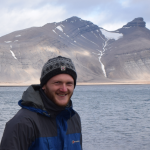Tell us about your contribution that has been recognised through the associate professorship.
The area I specified for my ‘outstanding contribution’ was Research and Innovation (R&I). I am a glacial geomorphologist: I use drones and satellite imagery to study glaciers and ice sheets (continent-sized glaciers), and the landscapes they leave behind when they melt, in order to better understand how ice responds to climate change (and in particular sea level rise), both in the past and in the future. Learning from the past and from modern glaciers will help us to understand how Greenland and Antarctica will respond to ongoing and future warming.
My ‘significant contribution’ was in Teaching and Learning (T&L). I teach on the BSc Geography and BSc Environmental Science degrees on modules allied to my interests, such as glaciers and glaciation, and a field trip to Iceland. I have also contributed to research-oriented modules, including the second year Research Methods module and supervising dissertation and PhD students.
In 2020 I became the head of research in the Department of the Natural and Built Environment (NBE) and, since taking up this post, have worked with others to develop a new research centre: the Centre for Sustainability and Climate (CSC). The CSC aims to bring different parts of the University together to form our response to the climate emergency and need for a more sustainable future.
What does it mean personally to you to be an Associate Professor at Sheffield Hallam?
To me, being an Associate Professor provides an opportunity to share my passion about my subject, and more importantly the wider implications of how humans are affecting natural systems on Earth, and what we need to do to counter this as a matter of priority.
Tell us a bit about your career story so far.
I have always enjoyed learning about the world. On the face of it, my career is a traditional academic one: I did a Geography degree, followed by a Master’s, then a PhD. For no particular reason I didn’t go down the postdoc route, but was lucky to get a fixed-term lectureship at Queen Mary University of London, before joining Sheffield Hallam in 2015. Whilst this may be perceived as a ‘traditional’ route, in reality it felt anything but. I did not grow up in a traditionally academic family (I remain the only person in my immediate family to get an A-level), and along the way I have also worked as a newsagent, got sacked from Pizza Hut for wearing brown shoes, stacked shelves in Tesco, and worked in a couple of call centres (including the first job post-PhD to make ends meet). It feels like this background has given me a good sense of perspective.
If you could go back in time and give yourself some career advice, what would it be?
I did not realise it at the time, but I suffered with imposter syndrome throughout my PhD, and as I started my lecturing career (actually, to this day). It felt (sometimes feels) like I was surrounded by brilliant people, but I was faking it. The advice I would give is that perceptions can be misleading (in both directions), and everyone starts from absolute zero – if you don’t know about a subject, or don’t have a skill, that is not a personal defect, but an opportunity to learn. Try not to compare yourself with those around you – focus on what you want to do.
What’s next? Tell us about how you want to further develop your contribution.
Next steps for my personal research are to set up projects using drones to monitor subglacial hydrology in Greenland, and to use Ground Penetrating Radar to uncover details of ancient subglacial hydrology in Finland, for which I will seek external funding through the Natural Environment Research Council (NERC) and the Royal Society.
At Sheffield Hallam, I am excited to contribute to the launch and management of the Centre for Sustainability and Climate. The centre will act as a hub for the University’s research into sustainability and the ongoing climate emergency.
In my role as head of research in NBE I hope to foster the progression of a more diverse team of Associate Professors and Professors.